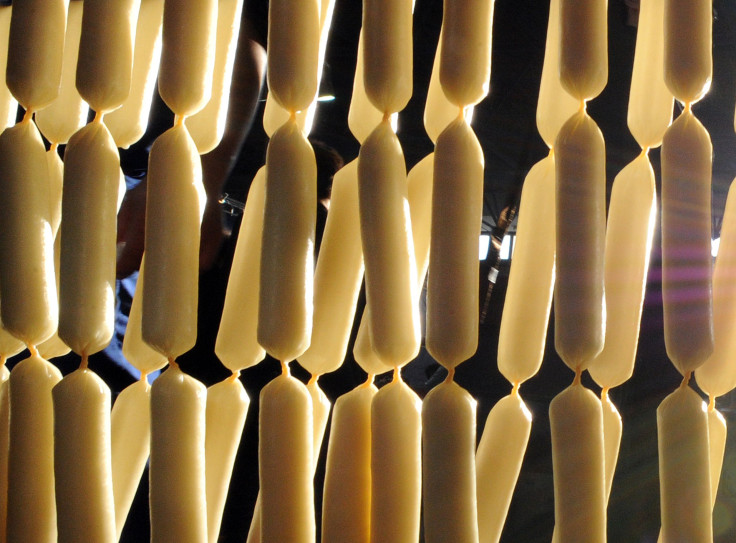Smuggled Frozen Meat Worth Almost Half A Billion Dollars Seized In China – Some Of It 40 Years Old

SHANGHAI -- China’s customs officials say a recent crackdown on food smuggling has netted more than $480 million worth of illegally imported frozen meat -- some of it up to 40 years old.
Twenty-one criminal gangs involved in the trade were arrested, according to the General Administration of Customs, and more than 100,000 tons of meat -- equivalent to around 8 percent of the country’s total annual official meat imports -- were seized during the campaign, which began on June 1, Chinese media reported.
In one case, in the southwestern region of Guangxi, officials found that some of the smuggled meat was far older than the dates on the packaging suggested -- in some cases dating back over 40 years, according to official reports. Shanghai news website The Paper said that officials had found smuggled pigs' feet from the 1970s, as well as chicken wings from the 1980s.
The China Daily newspaper quoted experts as saying that when meat is frozen, it’s impossible to tell how old it is. However, Leung Ka-sing, a professor of biology at Hong Kong’s Polytechnic University, said that meat that had survived for so long was likely to have been treated with large quantities of preservatives, which could cause cancer -- and could also contain dangerous bacteria, the South China Morning Post reported.
Imported meat has become popular in China in recent years, ironically because of concerns about the safety of China’s domestic food production industry. However, high duties on imported food have made smuggling a lucrative trade.
According to the China Daily, the meat seized in the crackdown included pork, beef and chicken wings. It quoted customs officials as saying that smuggled meat, some of it out of date, is typically bought for “very low prices” in unnamed “foreign countries.” (The Paper named the U.S. and India as key sources of beef smuggled into China.) After being shipped to Hong Kong, it is consolidated and shipped on to Haiphong, in northern Vietnam. From there it is smuggled into China on small boats, from the border city of Mong Cai, and then transported on small roads to avoid official checkpoints, according to The Paper.
The largest single seizure in the recent campaign came in Changsha, in southern China’s Hunan province, where police seized 800 tons of meat and arrested 20 people. The meat was reportedly destined for restaurants, supermarkets and online sales in several Chinese cities. One Changsha customs official said that when the container of meat was opened, the smell was so bad that he “nearly threw up,” the China Daily reported.
Officials said that in order to save money, smugglers often transported the meat in “ordinary vehicles instead of refrigerated ones. So the meat has often thawed out several times before reaching customers," adding to the dangers of eating it.
China has begun cracking down more seriously on the illegal trade in recent years -- in one case last year, for example, customs officials in the eastern province of Jiangsu seized 300 tons of illegally imported beef from an area of Brazil affected by mad cow disease.
However The Paper reported that it was hard for authorities to stop the smuggling, especially from Vietnam, as the smugglers were constantly opening new routes and docks.
In an attempt to combat illegal imports, Chinese authorities have recently pledged to reduce duties on many imported foodstuffs, and make it easier for good quality fresh food to be imported by legal channels, including e-commerce sites.
However food safety remains the highest "quality of life" concern for Chinese citizens, according to a survey by the China Youth Daily newspaper earlier this year, which found that 77.3 percent of respondents put it as their biggest worry -- above pollution --after a series of recent scandals.
The Chinese government is planning to introduce a new food safety law on Oct. 1, with what official media describe as tougher punishments for violators, and for officials who do not enforce regulations.
However the new law’s stipulation that people “found to have added substances unfit for human consumption to food could be jailed for up to 15 days” may be a limited deterrent in a market where cut-throat competition often leads to desperate cost-cutting.
In recent years China has been hit by scandals including banned chemical Clenbuterol added to pig feed in order to produce leaner pork, the use of recycled cooking oil and the sale of pork from diseased animals. In 2008, adulterated infant formula milk powder, diluted with water and melamine to save money, killed six babies and hospitalized thousands more across China.
And while a tightening of regulations is reported to be driving some of China’s low-end dairy producers out of business, this has apparently not stopped some companies from continuing to try to sell substandard products.
China's Food and Drug Administration on Wednesday ordered three milk producers in the northern province of Shaanxi to recall substandard infant formula products. It said the powdered milk products, all made from goat's milk, contained excessive quantities of substance including nitrates, which are often used as preservatives.
© Copyright IBTimes 2025. All rights reserved.






















